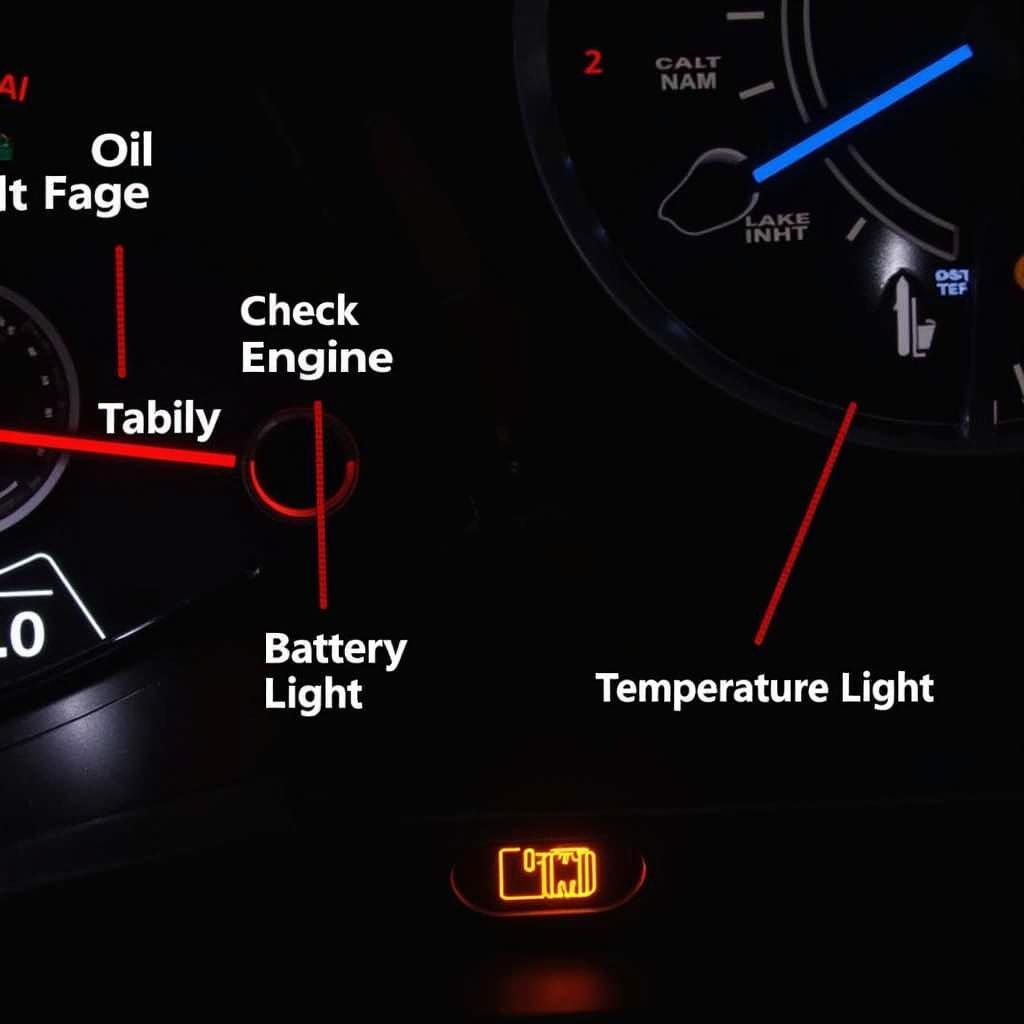Getting stranded with car trouble is never fun. Whether it’s a strange noise, a warning light, or a complete breakdown, “Car Problems Help” is probably what’s on your mind. This guide will empower you to diagnose and potentially fix common car issues, saving you time, money, and stress.
Understanding Your Car’s Language: Warning Lights and Sounds
Your car often communicates problems before they become major headaches. Ignoring these early warnings can lead to costly repairs down the line. Learn to recognize these signals:
- Check Engine Light: This ubiquitous light can indicate anything from a loose gas cap to a serious engine malfunction. Don’t panic, but don’t ignore it either. Get the diagnostic code read (often free at auto parts stores) to pinpoint the issue.
- Oil Pressure Light: Low oil pressure can severely damage your engine. If this light illuminates, pull over immediately and check your oil level.
- Battery Light: This indicates a problem with your charging system, often a failing alternator. You might experience dimming headlights or difficulty starting.
- Temperature Warning Light: An overheating engine can warp components and lead to catastrophic failure. If this light comes on, pull over safely and let the engine cool down.
 Common Car Warning Lights
Common Car Warning Lights
Common Car Problems and DIY Solutions
Many car problems can be addressed with basic tools and a little know-how. Here are a few examples:
- Flat Tire: Knowing how to change a flat tire is an essential skill. Keep a spare tire, jack, and lug wrench in your vehicle.
- Dead Battery: Jumper cables can be a lifesaver. Learn how to properly connect them to another vehicle’s battery to jumpstart your car.
- Overheating Engine: Check your coolant level and ensure there are no leaks. If the coolant is low, carefully add more when the engine is cool.
- Wipers Not Working: Check the wiper fluid level and replace the wiper blades if they are worn.
When to Seek Professional Car Problems Help
Some car problems require the expertise of a qualified mechanic. Here are some signs you should take your car to a shop:
- Complex Electrical Issues: Modern cars are heavily reliant on electronics. Diagnosing and repairing electrical problems requires specialized tools and knowledge.
- Transmission Problems: Transmission repairs can be complex and expensive. If you experience slipping gears, rough shifting, or unusual noises, consult a professional.
- Engine Knocking or Misfiring: These symptoms could indicate serious engine damage. Don’t delay seeking professional help.
- Brake Problems: Your brakes are critical for safety. Any issues with your brakes should be addressed immediately by a qualified mechanic.
“Don’t underestimate the importance of regular maintenance. A little preventative care can save you a lot of trouble in the long run,” advises John Smith, ASE Certified Master Technician.
Car Problems Help: Preventative Maintenance Tips
Regular maintenance is crucial for preventing car problems. Here’s a checklist:
- Regular Oil Changes: Follow the manufacturer’s recommended oil change intervals.
- Tire Rotations and Pressure Checks: Rotate your tires every 5,000-7,000 miles and check your tire pressure regularly.
- Brake Inspections: Have your brakes inspected annually or as needed.
- Fluid Checks: Regularly check and top off essential fluids like coolant, brake fluid, and power steering fluid.
Car Problems Help: Conclusion
Dealing with car problems can be frustrating, but with the right knowledge and resources, you can navigate these challenges effectively. Remember, regular maintenance is key to preventing many common car issues. Don’t hesitate to seek professional car problems help when needed. For expert assistance and advice, feel free to reach out to AutoTipPro at +1 (641) 206-8880 or visit our office at 500 N St Mary’s St, San Antonio, TX 78205, United States.
FAQ:
- How often should I check my tire pressure? At least once a month.
- What should I do if my check engine light comes on? Get the diagnostic code read.
- How can I prevent my car from overheating? Ensure your coolant level is adequate and there are no leaks.
- When should I replace my wiper blades? Every six months to a year, or when they start streaking.
- What does it mean if my car is making a grinding noise? It could indicate a problem with your brakes, transmission, or other components. Consult a mechanic.
- How can I improve my car’s fuel efficiency? Ensure proper tire inflation, regular maintenance, and avoid aggressive driving.
- Is it necessary to use premium gas? Only if your car’s manufacturer recommends it.
“Addressing car problems promptly can prevent small issues from becoming major expenses,” says Maria Garcia, Automotive Engineer.





Leave a Reply